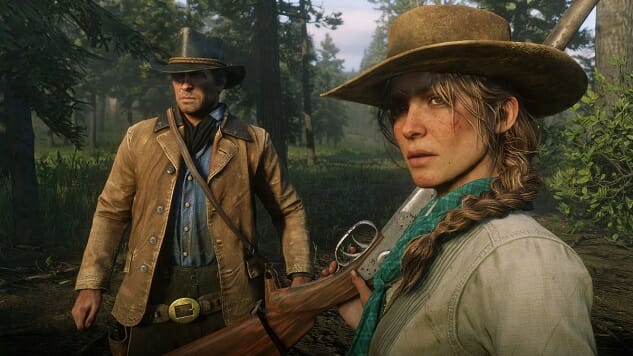Red Dead Redemption 2: Open World Games Are Still Incompatible With Linear Narrative
Games Features Red Dead Redemption 2
As I’ve written before, and about Red Dead Redemption 2 in particular, there’s an issue of balance between progression and narrative in open world game design. In an open world game, there’s always a lot to do, and part of the fun is taking it at your own pace. But often, open world games have a way of incentivizing and punishing exploration at the same time. By the time you find that sweet, overpowered weapon or perfect set of armor, it could be too late to use it. But if you venture out too early in the game, you may be thrust into situations your character isn’t prepared for. A good open world exploration game knows to gently guide the player through quests and locations while still buffering a light illusion of freedom.
It’s this same freedom to explore and, if we’re honest, waste time, that is at odds with linear storytelling. It’s almost impossible to balance the illusion of freedom with the player’s progression while ensuring each plot and story point are timed well for full impact. In the case of games that attempt a cohesive, meaningful narrative, linear storytelling and open world game design are fundamentally incompatible and their struggle to coexist can sabotage an entire game. Perhaps it’s time these two simply got out of each other’s way.
This came up for me a lot as I neared the end of Arthur’s character arc in Red Dead Redemption 2. Over the course of the dozens upon dozens of hours it took to progress across the map, I got so caught up in the collectibles and side tasks that I almost forgot to play the main game. Over the years, open world exploration games have taught me that traveling off the beaten path means finding strategic items that will do me far more good early on in the game than they will later. A lot of stuff, particularly weapons and armor, are all but nerfed by not being available at the general time a player will reach their location. But as I began to realize how much of the main questline of Red Dead Redemption 2 that I hadn’t gotten through yet, and how much time I’d spent on hunting, exploration, collectibles and gathering plants, it became crushingly clear not just that the game is massive, but that, in the many hours I spent away from the camp and the gang and the many NPCs begging to give me quests, I lost sight of what the game was actually about.
How the distraction of exploration, sidequests and secondary tasks affect the message of a game is important to examine in light of what Red Dead Redemption 2 tries to achieve narratively. When certain issues come up in a videogame—a problematic theme or scene, for example—often the response to the resulting criticism argues to later points in the game that subvert or challenge the material. But what happens in an open world game where a player might spend a disportionate amount of time in a certain section of the game that reflects a worldview only subverted or challenged later? Red Dead Redemption 2 is a game about issues of morality and reckoning the past, but far more time can be spent robbing stage coaches and looting homesteads than actually pondering on any of the game’s harder themes. For some, the point will get lost amid the time sink of doing bad. If a game takes so long to make its point that the player may never get there, then what’s the point of saying anything important at all?
As much as I love open world games, I worry that the contradiction of linear narrative will continue to undermine the genre. There’s still plenty to do with a sandbox environment that doesn’t rely on narrative cohesion. But open world games also suffer in other ways when they are not given structure. Maybe it’s not linear narrative that is the problem but rather the expectation and illusion of player freedom. Whatever the case, even the scope and beauty of a game like Red Dead Redemption 2 can’t make up for the lessened impact and narrative contradictions that arise from open world game design. In the case of linear narrative and open world game design, something’s gotta go.
Holly Green is the assistant editor of Paste Games and a reporter and semiprofessional photographer. She is also the author of Fry Scores: An Unofficial Guide To Video Game Grub. You can find her work at Gamasutra, Polygon, Unwinnable, and other videogame news publications.